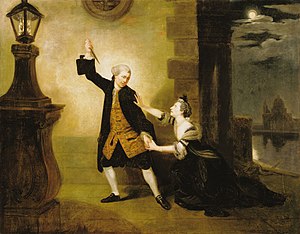“See the Court cheat the injurd people With a Shew of Justice”
It should be no surprise that Bostonians continued to wrangle over the Boston Massacre trials even after they ended with two manslaughter convictions and eleven acquittals.
One response was recounted by Thomas Hutchinson in the last volume of his history of Massachusetts, published decades after his death:
The 17 December Boston Gazette responded:
In fact, enough people knew Venice Preserv’d to take issue with the claim in Edes and Gill’s newspaper that the handbill on the Town House was merely a “verbatim” quotation from it. On 20 December Richard Draper of the Boston News-Letter printed “a Copy of that that was posted up, and also the Lines from Otway, whereby our Readers may judge for themselves.”
Otway’s original lines were:
TOMORROW: Responses, legal and literary.
[The picture above shows David Garrick and Susannah Cibber performing Venice Preserv’d, as painted by Johan Zoffany.]
One response was recounted by Thomas Hutchinson in the last volume of his history of Massachusetts, published decades after his death:
A few days after the trials, while the court continued to sit, an incendiary paper was posted up, in the night, upon the door of the town house, complaining of the court for cheating the injured people with a shew of justice, and calling upon them to rise and free the world from such domestick tyrants. It was taken down in the morning, and carried to the court, who were much disturbed, and applied to the lieutenant-governor [i.e., Hutchinson himself], who laid it before the council…The text of the “incendiary paper” as eventually published:
To See the Sufferings of my fellowThe Council advised acting governor Hutchinson to issue “a proclamation with a reward for discovering the offender.” He did so on 13 December, offering £100 to anyone who could identify the person who posted the notice. The historian Hutchinson later wrote, “there was no room to suppose [that] would have any effect.”
Townsmen and own my self a man, to
See the Court cheat the injurd people
With a Shew of Justice which yet we
never can taste of, drive us like wrecks
down the rough tide of power while
no hold is left to save us from destructi-
on. All that Bear this are slaves, and we are
such, not to rise up at the great Call of
Nature and free the world from such Domestic
Tyrants.
The 17 December Boston Gazette responded:
A very abusive Paper, which was said to be posted upon the Door of a public Building a few Mornings ago, we are told was taken verbatim from a Play called Venice Preserved; and that Mr. Otway was actually the Author. He and his Accomplices have been dead long ago, and can never be punished for it in this Life, unless the Doctrine of Transmigration is true.Thomas Otway’s 1682 play Venice Preserv’d was quite popular among the British, its setting long interpreted as a stand-in for their own country. Of course, local law prevented the drama from being performed publicly in Massachusetts, but people read it. Hannah Quincy discussed it with young John Adams. Josiah Quincy, Jr., alluded to it in a letter.
The impertinant Man who posted it up, deserves all the Punishment which the Law can inflict, for so heinous a Crime—We will not dive into the Heart of this imprudent Man; but if he really intended, as some say, to reflect upon the Powers that be, and to inflame the Minds of the People against them, he has missed his Aim; and always will, while every one so clearly sees, that they are, if we may be allow’d to quote the Scripture Language, “Terrors to Evil Doers, and a Praise to THEM that do WELL.” It will be the Wisdom of this People, as it is their Duty, to have a Guard upon their Passions, and be peaceable.
In fact, enough people knew Venice Preserv’d to take issue with the claim in Edes and Gill’s newspaper that the handbill on the Town House was merely a “verbatim” quotation from it. On 20 December Richard Draper of the Boston News-Letter printed “a Copy of that that was posted up, and also the Lines from Otway, whereby our Readers may judge for themselves.”
Otway’s original lines were:
To see the Sufferings of my Fellow-creatures,The News-Letter thus displayed the complaint about the Massacre trials to many more people than saw it when it hung on the Town House for a few dark hours.
And own myself a Man; to see our Senators
Cheat the deluded People with a Shew
Of Liberty, which yet they ne’re must taste of.
They say, by them our Hands are free from Fetters,
Yet whom they please, they lay in basest Bonds;
Bring whom they please to Infamy and Sorrow;
Drive us like Wrecks down the rough Tide of Power,
Whilst no Hold is left to save us from Destruction.
All that bear this are Villains: and I one,
Not to rouze up at the greatest Call of Nature,
And check the Growth of these domestic Spoilers,
That make us Slaves, and tell us ’tis our Charter.
TOMORROW: Responses, legal and literary.
[The picture above shows David Garrick and Susannah Cibber performing Venice Preserv’d, as painted by Johan Zoffany.]


2 comments:
In the face of government officials moving themselves to the front of the Coronavirus vaccination line and some state governors while kowtowing to the moneyed aristocracy are shuttering small businesses while leaving open the large, I would venture to say the quoted lines from Thomas Otway’s 1682 play Venice Preserved are as timely today as they were when he wrote them.
Let’s hope things improve for us since Venice Preserv’d, being a tragedy, doesn’t end well for its protagonists.
Post a Comment